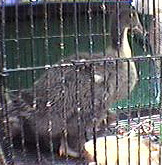
|
|
|
by Lori Goodman  
It's the classic story, pet stores sell thousands of live ducklings every year. Baby ducks are hard to resist, and pet stores know it. What happens to most ducklings once they're fully grown and not so cute and cuddly? Thousands tragically end up abandoned, dumped into local ponds, lakes and canals where they die from causes ranging from malnutrition to predatory attacks. People have been led to believe that ducks are easy to care for and make great pets. Unless you are fully prepared, nothing could be further from the truth. Before you buy, prepare yourself and your family A duck can make a wonderful and interesting pet, if you are willing to take a minute to learn the facts. If you decide to buy a live duckling, be sure it is not an impulse purchase. Prepare yourself, your family and your new pet by reading our Duckling Care flyer. Here's a few facts the pet stores don't tell you about ducks. • Ducklings are fully grown in 30 days. • A domestic duck lives 10 to 20 years, sometimes longer. • Ducks can transmit salmonella [ according to the Centers for Disease Control and Prevention (CDC) ]. • Domestic ducks must eat duck food with 16-17% protein to stay healthy. Most pet stores do not carry duck food and will try to sell you food that is not nutritionally correct for ducks. • Medicated food and water can kill a duck. Some foods are designed to grow a duck fast for slaughter and are not intended for long term use. • Pine chips, cedar chips and other wood shavings can cause intestinal blockages and choking. • A duck dumped into a public pond or lake will likely not survive until its 1st birthday. • Ducks do not make good starter pets for children, they are not easy to care for. • Duck wings, legs and necks are fragile and injure easily. • Ducks can peck and pinch aggressively. • Ducks are extremely messy eaters and poop alot. • A duck can not be potty trained, they do not have a sphincter muscle. • It is inhumane to cage ducks. • Ducks are intelligent. They feel sadness, pain and emotions. • Domestic ducks need alot of attention, they get depressed when left alone. • Ducks can develop health problems and cannot be treated by a standard "dog or cat" veterinarian. • Exotic veterinary bills are prohibitively expensive. • Ducks need daily care, including clean water for drinking and swimming, clean, dry bedding, a proper diet and shelter. Neglecting just one of these necessities can result in serious illness, disease or death. • Domestic ducks are prone to several diseases and respiratory illnesses, some of which can infect humans. • Nearly all breeds of domestic ducks cannot fly to escape danger or to get to food like their wild duck cousins. • Releasing a domestic duck into the wild is an act of cruelty; it shortens their lifespan dramatically. • There are fundamental differences between domestic ducks and wild ducks, do you know what they are? • Who will be the primary care giver of your new pet? • How much do you know about a duck's care and feeding? Did you know that many pet stores that sell ducks do not carry the proper food to maintain your duck's health? • Who will care for your duck when you are away for more than 24 hours? • Do you live in a harsh climate? • Is your city zoned for domestic waterfowl? If not, you will be forced to give up your pet. • What sort of shelter from predators and weather will you provide? • Who will you take your duck to when it gets sick or injured? • Can you afford a veterinary bill that typically runs several hundred dollars? • Do you have other pets? Most cats and dogs do not get along with ducks or can suddenly turn predatory and attack after being around the duck for some time, even years. Ducks are known to unintentially provoke attacks. • Do you have small children? Children can easily injure or kill a duck. A duck can pinch and peck aggressively, causing bruising and other injuries to children. • Tell people what you learned on the Live Ducks website. • Print copies of my Duckling Care Flyer and take it to places where ducks are sold without care instructions. • Encourage your Parks and Recreation Departments to post signs warning people about the dangers of dumping domestic waterfowl into wild ecosystems. Do your part to make a duck's life safer, happier, better. 
This duckling is 3 weeks old and has outgrown her cage We know you are reading this because you share our love for these creatures. We thank you for caring and encourage you to educate others. There are hundreds of news articles, webpages, and warnings about the growing animal cruelty problems caused by good-hearted people making uneducated choices. Here are my top picks: • CDC: Why parents should think twice before giving baby birds for Easter • Prevent Easter Cruelty to Animals • Abandoned domestic ducks and geese left to fend for themselves • Real Animals Don't Make Appropriate Easter Gifts • CDC: Salmonella hadar Associated with Pet Ducklings |